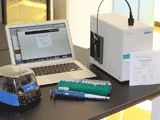DuPont Nutrition & Health today announced that the U.S. Department of Agriculture's (USDA) Food Safety & Inspection Service (FSIS) has added to its Microbiology Laboratory Guidebook (MLG) the DuPont BAX® System molecular method for detecting E. coli O157:H7 and non-O157 Shiga toxin-producing E. coli (STEC) in meat products, carcass and environmental sponges.
"We are extremely pleased that the BAX® System has once again been evaluated by the FSIS and found to meet the agency's standards for performance," said Doris Engesser-Sudlow, global director for molecular diagnostics, DuPont Nutrition & Health. "DuPont was the first to offer molecular-based pathogen tests to the food market, and our commitment to continuous improvement is still providing the best science-based solutions for evolving food protection needs."
Effective Oct. 1, 2013, FSIS microbiologists can use BAX® System real-time assays to routinely monitor regulated foods for pathogenic E. coli. The MLG already specifies the BAX® System method for detecting Salmonella and Listeria monocytogenes. While inclusion does not constitute endorsement, the methods contained in the MLG are those that the FSIS uses for analysis of meat, poultry and other products within the agency's jurisdiction.
Food processing companies around the world rely on the BAX® System to detect pathogens or other organisms in raw ingredients, finished products and environmental samples. The automated system uses leading-edge technology, including PCR assays, tableted reagents and optimized media to detect Salmonella, Listeria species, Listeria monocytogenes, E. coli O157:H7 and STEC, Campylobacter, Staphylococcus aureus, Vibrio, and yeast and mold. Many of these tests have been certified by AOAC and AFNOR and/or approved by government agencies in the Americas, Asia and Europe. For more information about the BAX® System, please visit www.fooddiagnostics.dupont.com.




